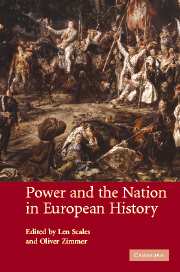Book contents
- Frontmatter
- Contents
- List of contributors
- Introduction
- PART I APPROACHES AND DEBATES
- PART II THE MIDDLE AGES
- PART III ROUTES TO MODERNITY
- PART IV MODERNITY
- 12 Enemies of the Nation? Nobles, foreigners and the constitution of national citizenship in the French Revolution
- 13 Nation, nations and power in Italy, c. 1700–1915
- 14 Political institutions and nationhood in Germany, 1750–1914
- 15 Nation, nationalism and power in Switzerland, c. 1760–1900
- 16 Nation and power in the liberal state: Britain c. 1800–c. 1914
- Index
14 - Political institutions and nationhood in Germany, 1750–1914
Published online by Cambridge University Press: 02 December 2009
- Frontmatter
- Contents
- List of contributors
- Introduction
- PART I APPROACHES AND DEBATES
- PART II THE MIDDLE AGES
- PART III ROUTES TO MODERNITY
- PART IV MODERNITY
- 12 Enemies of the Nation? Nobles, foreigners and the constitution of national citizenship in the French Revolution
- 13 Nation, nations and power in Italy, c. 1700–1915
- 14 Political institutions and nationhood in Germany, 1750–1914
- 15 Nation, nationalism and power in Switzerland, c. 1760–1900
- 16 Nation and power in the liberal state: Britain c. 1800–c. 1914
- Index
Summary
What did it mean to be German in, say, 1780 and how had this changed by about 1900?
Any attempt to answer this question has to engage with two different kinds of debate about the nature of national identity in Europe between the French Revolution and the First World War. As has so often been remarked, the period between 1789 and 1914 – often known as ‘the long nineteenth century’ – was the great age of nationalism. Opening with the French Revolutionaries' ‘invention’ of the nation in the 1790s and closing with the mass nationalist agitation that accompanied the outbreak of the First World War, the nineteenth century witnessed Europe's transition from a continent of undemocratic, dynastic, territorial states to a Europe in which the nation-state, governed through representative institutions, was emerging as the predominant form of political organisation. These changes went hand in hand with socio-economic and cultural modernisation: demographic growth, industrialisation, urbanisation, secularisation, the growth of literacy, increased geographical and social mobility and so on. Some theorists of nationalism, such as Ernest Gellner, Eric Hobsbawm, Benedict Anderson and John Breuilly, have seen these two phenomena as interdependent in different ways. Others, such as Adrian Hastings and Liah Greenfeld, have questioned the extent to which nationalism was an essentially modern phenomenon, arguing instead that it emerged in different cultural and political communities at different times and in different ways. Which of these schools of thought best reflects the German experience?
- Type
- Chapter
- Information
- Power and the Nation in European History , pp. 315 - 332Publisher: Cambridge University PressPrint publication year: 2005



